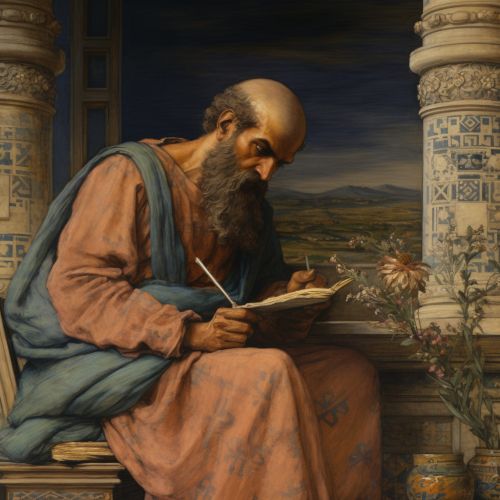Aeschylus
Early Life
Aeschylus was born in 525 BC in the city of Eleusis. He was the son of Euphorion, a member of the noble Eupatridae, the ancient nobility of Attica. Although his family was wealthy, they were not among the most powerful dynasties of the time. Aeschylus's mother's name is not known, but she was likely of a similar social status to his father.
Career
Aeschylus began his career as a playwright in his early twenties. His first play was produced in 499 BC, and he quickly gained a reputation for his innovative and powerful tragedies. Over the course of his career, Aeschylus wrote some 70 to 90 plays, of which only seven have survived in complete form: The Persians, Seven Against Thebes, The Suppliants, and the trilogy Oresteia, which consists of Agamemnon, The Libation Bearers, and The Eumenides.


Aeschylus's plays were known for their grandeur, serious tone, and moral complexity. He is often credited with introducing the second actor to the stage, transforming the drama from a primarily narrative form into a more dialogic one. This innovation allowed for more complex character interactions and dramatic conflict.
Influence and Legacy
Aeschylus is often referred to as the "father of tragedy". His works had a significant influence on the development of drama, not only in ancient Greece, but also in the Western tradition as a whole. His plays are still performed and studied today, and his innovations in staging and dramatic structure have had a lasting impact on the art of theatre.
Aeschylus's influence can be seen in the works of later Greek playwrights such as Sophocles and Euripides, as well as in the Roman dramas of Seneca. His themes and characters have been reinterpreted in countless adaptations and reimaginings over the centuries, from Renaissance plays to modern films and novels.
Death and Posthumous Recognition
Aeschylus died in 456 BC in Gela, a Greek colony in Sicily. According to legend, he was killed by a tortoise dropped by an eagle who mistook his bald head for a rock. Despite the unusual circumstances of his death, Aeschylus was widely mourned and his work continued to be celebrated after his death.
In the centuries following his death, Aeschylus's plays were frequently performed and copied. His reputation as a great tragedian has endured, and his plays continue to be performed and studied in the 21st century. Aeschylus's contributions to the art of drama have been recognized by numerous awards and honors, including the prestigious City Dionysia festival, where he won first prize 13 times.
